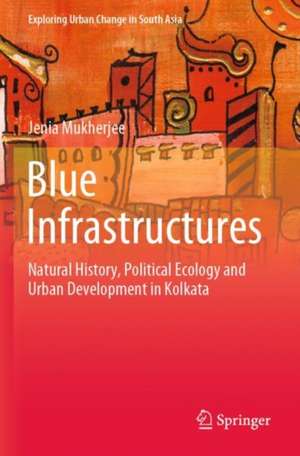Blue Infrastructures: Natural History, Political Ecology and Urban Development in Kolkata: Exploring Urban Change in South Asia
Autor Jenia Mukherjeeen Limba Engleză Paperback – 29 mai 2021
| Toate formatele și edițiile | Preț | Express |
|---|---|---|
| Paperback (1) | 363.52 lei 38-44 zile | |
| Springer Nature Singapore – 29 mai 2021 | 363.52 lei 38-44 zile | |
| Hardback (1) | 375.45 lei 38-44 zile | |
| Springer Nature Singapore – 28 mai 2020 | 375.45 lei 38-44 zile |
Preț: 363.52 lei
Nou
Puncte Express: 545
Preț estimativ în valută:
69.57€ • 72.48$ • 57.84£
69.57€ • 72.48$ • 57.84£
Carte tipărită la comandă
Livrare economică 06-12 februarie 25
Preluare comenzi: 021 569.72.76
Specificații
ISBN-13: 9789811539534
ISBN-10: 9811539537
Pagini: 239
Ilustrații: XXV, 239 p. 31 illus., 15 illus. in color.
Dimensiuni: 155 x 235 mm
Ediția:1st ed. 2020
Editura: Springer Nature Singapore
Colecția Springer
Seria Exploring Urban Change in South Asia
Locul publicării:Singapore, Singapore
ISBN-10: 9811539537
Pagini: 239
Ilustrații: XXV, 239 p. 31 illus., 15 illus. in color.
Dimensiuni: 155 x 235 mm
Ediția:1st ed. 2020
Editura: Springer Nature Singapore
Colecția Springer
Seria Exploring Urban Change in South Asia
Locul publicării:Singapore, Singapore
Cuprins
Introduction.- The natural evolution of the urban.- Tamed Interventions.- Untamed practices.- Disrupted networks.- Transformed infrastructures.- Polemics of planning, development and environment.- Urban environmentalisms.- Beyond declensionism, towards the useful narrative.
Recenzii
“I would recommend this as an essential read for the scholars, activists, practitioners and policymakers working on urban environmental issues. Blue Infrastructures is a good introduction and starting point for the socio-political contextualisation of the meta-narrative of the Anthropocene at the urban level.” (Shilpa Dahake, Urbanisation, June 26, 2022)
Notă biografică
Jenia Mukherjee is an Assistant Professor at the Department of Humanities and Social Sciences, Indian Institute of Technology Kharagpur. Her research interests include urban sustainability, environmental history, political ecology and development studies. In 2013, she was awarded the World Social Science Fellowship on ‘Sustainable Urbanization’ by the International Social Science Council. She has published papers and chapters in peer-reviewed journals and edited volumes, and has engaged in international projects on urban environmental issues. Her most recent book (edited) is Sustainable Urbanization in India: Issues and Challenges (Springer, 2018). She was awarded the prestigious Carson Writing Fellowship (2018-19) by the Rachel Carson Center for Environment and Society, Munich, Germany for completing this book project: Blue Infrastructures: Natural History, Political Ecology and Urban Development in Kolkata.
Textul de pe ultima copertă
This book focuses on Kolkata, formerly the colonial capital of and currently a major megacity in India, in terms of its extensive blue infrastructures, i.e., its rivers, canals and wetlands as an integrated composite whole. It unfolds ways in which this reclaimed urban space could determine, and in turn, could get determined by political fate, economic calculations and social livelihoods across changing political-economic imperatives and with large-scale implications on urban sustainability. Employing historical urban political ecology (HUPE) as the methodological framework by combining urban environmental history and urban political ecology, the book studies the changing urban environmental equations through several centuries, and its impact on the city and its people. Weaving the past, present and posterity of deltaic Kolkata, the book demonstrates that it is in these ‘blue infrastructures’ that the anecdote of origin, the account of functioning and the apprehension of survival of the city is rooted. By emphasizing the ecology ‘of’ cities instead of ecology ‘in’ cities approach, the book exposes the limitations of contemporary ecological restructuring efforts regarding Indian cities. Further, it offers a blueprint for future innovative and empirical research focusing on other major cities. Accordingly, this topical and original book will be of interest to students and researchers of environmental humanities, political ecology and urban studies.
Caracteristici
Studies the complex interactions between cities, nature, and technology over extended timescales Employs the historical urban political ecology approach (HUPE), which combines urban environmental history and urban political ecology Draws on rich archival and ethnographic findings to capture the transformations of Kolkata’s blue infrastructure








